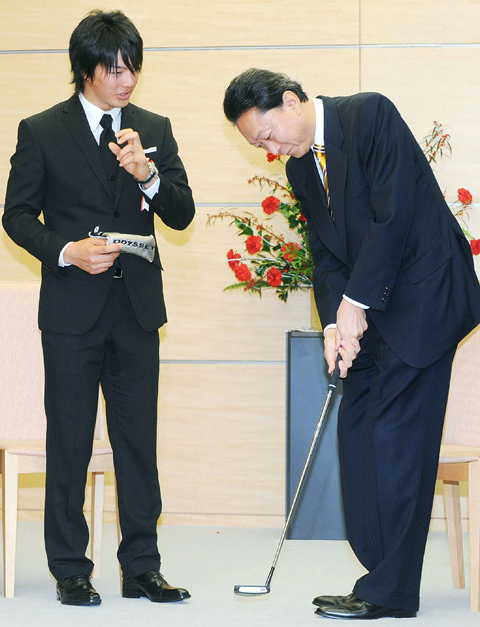Relocating a contentious US airbase in its entirety from southern Japan to Guam is “unreasonable” Japanese Prime Minister Yukio Hatoyama told a radio program.
Hatoyama said it would not be practical to shift the whole base, which has been the subject of friction between Tokyo and Washington, from Okinawa to the US-controlled Pacific Ocean territory.
“Thinking realistically, it would be unreasonable to relocate all its functions to Guam from the standpoint of deterrence,” Hatoyama told a Nippon Radio program on Saturday.

PHOTO: AFP
MOVE TO THE COAST?
The US Marine Corps’ Futenma Air Station currently sits in a crowded urban area of Okinawa. Tokyo and Washington agreed in 2006 to move it out to a coastal region, away from the population, many of whom resent its presence.
The agreement was part of a broader realignment of US military forces in Japan and includes the redeployment of around 8,000 Marines from Okinawa to the US territory of Guam.
Soon after coming to power, Hatoyama’s center-left government announced a review of the agreement, provoking irritation in Washington.
SOFT-PEDAL
However, Hatoyama appeared to soft-pedal the review in his weekend comments to the broadcaster.
“Moving more than [the 8,000 Marines] is very difficult,” Hatoyama told the station.
Since its defeat in World War II, officially pacifist Japan has relied on a massive US military presence to guarantee its security, initially as an occupier and later as an ally.
However, the dispute over Futenma has raised fears among some Japanese that this alliance might cool, at a time when a rising China is making its presence felt across Asia.
Hatoyama’s comments met with immediate ire from the Socialists in his ruling coalition, who favor shifting the base out of the country, the Yomiuri Shimbun reported, citing unnamed senior officials in the party.
“I wonder if he [Hatoyama] intends to force the Socialists out of the coalition government,” the Socialist official reportedly said.
Hatoyama’s Democratic Party of Japan (DPJ) needs votes from Socialists and another junior coalition partner for a majority in the upper house of parliament.
MORE ‘EQUAL’
Hatoyama’s government took power in Japan in August after half a century of almost continuous conservative rule, pledging to review past agreements on the US military presence and to deal with Washington on a more “equal” basis.
The US, which defeated Japan in World War II and then occupied the country, now has 47,000 troops stationed there, more than half of them on Okinawa, the site of one of the bloodiest battles of the war.

END OF AN ERA: The vote brings the curtain down on 20 years of socialist rule, which began in 2005 when Evo Morales, an indigenous coca farmer, was elected president A center-right senator and a right-wing former president are to advance to a run-off for Bolivia’s presidency after the first round of elections on Sunday, marking the end of two decades of leftist rule, preliminary official results showed. Bolivian Senator Rodrigo Paz was the surprise front-runner, with 32.15 percent of the vote cast in an election dominated by a deep economic crisis, results published by the electoral commission showed. He was followed by former Bolivian president Jorge “Tuto” Quiroga in second with 26.87 percent, according to results based on 92 percent of votes cast. Millionaire businessman Samuel Doria Medina, who had been tipped

ELECTION DISTRACTION? When attention shifted away from the fight against the militants to politics, losses and setbacks in the battlefield increased, an analyst said Recent clashes in Somalia’s semi-autonomous Jubaland region are alarming experts, exposing cracks in the country’s federal system and creating an opening for militant group al-Shabaab to gain ground. Following years of conflict, Somalia is a loose federation of five semi-autonomous member states — Puntland, Jubaland, Galmudug, Hirshabelle and South West — that maintain often fractious relations with the central government in the capital, Mogadishu. However, ahead of elections next year, Somalia has sought to assert control over its member states, which security analysts said has created gaps for al-Shabaab infiltration. Last week, two Somalian soldiers were killed in clashes between pro-government forces and

Ten cheetah cubs held in captivity since birth and destined for international wildlife trade markets have been rescued in Somaliland, a breakaway region of Somalia. They were all in stable condition despite all of them having been undernourished and limping due to being tied in captivity for months, said Laurie Marker, founder of the Cheetah Conservation Fund, which is caring for the cubs. One eight-month-old cub was unable to walk after been tied up for six months, while a five-month-old was “very malnourished [a bag of bones], with sores all over her body and full of botfly maggots which are under the

BRUSHED OFF: An ambassador to Australia previously said that Beijing does not see a reason to apologize for its naval exercises and military maneuvers in international areas China set off alarm bells in New Zealand when it dispatched powerful warships on unprecedented missions in the South Pacific without explanation, military documents showed. Beijing has spent years expanding its reach in the southern Pacific Ocean, courting island nations with new hospitals, freshly paved roads and generous offers of climate aid. However, these diplomatic efforts have increasingly been accompanied by more overt displays of military power. Three Chinese warships sailed the Tasman Sea between Australia and New Zealand in February, the first time such a task group had been sighted in those waters. “We have never seen vessels with this capability